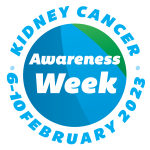Your basket is currently empty!
Our Kidney Cancer Patient Survey 2022 Report

Kidney cancer guidelines for doctors needed now
In the week of Kidney Cancer Awareness Week 2023, Kidney Cancer UK called for the National Institute for Health and Care Excellence (NICE) to develop guidelines on diagnosis and treatment of kidney cancer as a matter of top priority. NHS England has commissioned NICE to do the work, but the results of our patient survey show that the guidelines are urgently needed. Earlier diagnosis not being achieved
The latest patient survey published today by Kidney Cancer UK shows that almost a third (31%) of patients waited over three months from first presenting to their doctor to being given a diagnosis. 22% of patients were initially misdiagnosed.
The need to find kidney cancer early must be addressed by clear guidelines on referral and diagnosis. The patient survey (which ran from 24th September 2022 to 23rd October 2022 and received 652 responses, 542) shows that 48% of patients’ kidney cancer was only picked up incidentally when they had a medical scan or test for a condition unrelated to kidney cancer.
Our survey shows that over 40% of kidney cancer patients are waiting 3 to 5 weeks for their scan results. We have yet to see the impact on kidney cancer patients of the expanded access to diagnostic scans announced in November 2022 by NHS England Chief Executive Amanda Pritchard, but this and other findings in the survey have shown little or no improvement over previous years.
Professor Grant Stewart (University of Cambridge) said: “The static nature of the statistics in this survey is deeply concerning as diagnosis and services are stalling post-Covid-19. This coupled with 40% of patients still being diagnosed at late stages 3 and 4, a figure that has remained the same for three years of this survey, highlights the fact that the NHS Long Term Plan aim of diagnosing three in four cancers at stages 1 or 2 by 2028’ is currently unlikely.”
concerning as diagnosis and services are stalling post-Covid-19. This coupled with 40% of patients still being diagnosed at late stages 3 and 4, a figure that has remained the same for three years of this survey, highlights the fact that the NHS Long Term Plan aim of diagnosing three in four cancers at stages 1 or 2 by 2028’ is currently unlikely.”
Many patients unhappy with the way they were told they had kidney cancer
When a diagnosis is made, a disturbing percentage of patients were unhappy with the way their cancer diagnosis was delivered; many receiving a diagnosis in a phone call. 34% were unhappy with how they were told, saying their diagnosis should have been shared in a more ‘sensitive way’, that it ‘felt rushed’, and they wanted more information at that time. 41% said they were not given enough information on kidney cancer at diagnosis to read later and almost a quarter were not given the name of a clinical nurse specialist for support.
Effective, less invasive treatment not being taken up
The absence of guidelines for clinicians may be contributing to the low uptake of less invasive ablative treatments for kidney cancer such as cryoablation (freezing tumours to destroy them) which only 1.34% of patients in our survey received.
Dr David Breen, Associate Professor of Radiology at the University Hospital of Southampton said: “We need to look to less invasive but effective treatments such as Cryoablation for sub-4-5cm kidney tumours. This reflects the patients’ needs and importantly spares background kidney function. Whilst not right for all kidney cancer patients, ablation needs to be discussed with those who have smaller (sub-5cm) kidney cancer. Ablative treatments are equally effective, less invasive, have a lower complication rate and require less time in hospital; often a patient is back to work within a few days as opposed to up to 6-weeks with surgery.”
 Talk about kidney cancer
Talk about kidney cancer
This week (6-10th Februray 2023) is Kidney Cancer Awareness Week, culminating with Green Friday on 10th February, the charity is encouraging people to be aware of their body and if there is anything new or unusual about which they are not sure, to speak to a health professional. The four most common symptoms associated with kidney cancer in our latest survey were pain in back/ flank/ side, fatigue, night sweats, blood in the urine.
Nick Turkentine, CEO of Kidney Cancer UK concluded: “We can improve the rates of people surviving kidney cancer by being more aware of symptoms. Doing so will lead to earlier diagnosis which improves the chances of making a full recovery. The 6th to 10th February 2023 is Kidney Cancer Awareness Week where we want people to talk about kidney cancer. We do not want the first time someone hears those two words ‘kidney cancer’ to be when they, or a family member, receive a diagnosis.”





